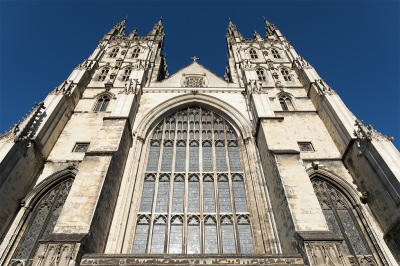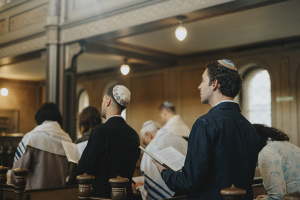Another denomination ditches Christianity to start its own religion

Around a century ago, renowned biblical scholar J. Gresham Machen was alarmed by the creeping secular humanism he saw invading institutional Christian spaces, which prompted him to issue this sharp rebuke via his book Christianity and Liberalism:
“[W]hat the liberal theologian has retained after abandoning to the enemy one Christian doctrine after another is not Christianity at all, but a religion which is so entirely different from Christianity as to belong in a distinct category.”
Unfortunately for us, Machen didn’t know how right he was.
This brings us to the latest development shaking up the Church of England.
For background, the Church of England is enormous, boasting a whopping 85 million members located in 165 countries. As you may have heard, they have been in the news recently for charting a course that can only be described as consciously divorcing themselves from the historic teachings of the Christian faith.
Of course, their governing body, or “synod,” would deny such a characterization, but what other conclusion can one come to after reading this statement?
“For the first time, the Church of England will publicly, unreservedly and joyfully welcome same-sex couples in church.”
That’s how the Archbishop of Canterbury, Justin Welby, and the Archbishop of York, Stephen Cottrell, reacted once their “synod” voted to endorse same-sex unions.
To remove any doubt, this move wasn’t a clarification that the Church’s doors are open to everyone because we all fall short of the glory of God, but an assertion that same-sex couples attending their parishes can now “dedicate their relationship to God and receive God’s blessing.”
The vote was 250-181, and in many ways wasn’t that surprising, especially considering the Church of England ordains homosexual priests under the promise that they remain “celibate.”
Right.
In any event, Sarah Mullally, the “bishop” of London, called the measure a “moment of hope for the church,” adding,
“I know that what we have proposed as a way forward does not go nearly far enough for many, but too far for others. It is my prayer that what has been agreed today will represent a step forward for all of us within the Church — including LGBTQI+ people — as we remain committed to walking together.”
What Mullally means by not going far enough is that their “Anglican Communion” will still not perform same-sex marriages. Just give them a few years, though. It’ll happen, probably around the same time that Mullally opens up a transgender clinic adjacent to her diocese.
Another supporter, Vicky Brett, a lay member of the “synod,” argued in favor of the motion by chiding her conservative colleagues with this rhetorical question: “Do you have any business crossing people off the guest list, or interfering with God’s welcome?”
You see what I mean about these people starting their own religion?
Church leaders do desire a very large guest list … so that they can introduce as many folks as possible to the saving power of the Cross.
No matter.
Steven Croft, the bishop of Oxford, praised the “significant and historic step” because “same-sex couples will become much more visible and their relationships will be celebrated publicly,” which, he expects, “will continue to change attitudes within the life of the Church.”
For their part, archbishops Welby and Cottrell punctuated the “historic step” of the vote by declaring that, “above all we continue to pray, as Jesus himself prayed, for the unity of his church and that we would love one another.”
It’s like they grabbed the Apostle Paul’s list of vices to avoid in 1 Corinthians 6:9-11 and are using portions of it as a roadmap for what conduct they ought to “bless” from the pulpit.
Imagine the Archbishop of Canterbury spearheading a vote where thieves can now “dedicate their relationship to God and receive God’s blessing” for grand larceny.
Yet that’s precisely the “logic” he’s using in sanitizing a behavior that is unequivocally at odds with biblical orthodoxy.
Paul writes,
“Do not be deceived: neither the sexually immoral, nor idolaters, nor adulterers, nor men who practice homosexuality, nor thieves, nor the greedy, nor drunkards, nor revilers, nor swindlers will inherit the kingdom of God.”
Forget “homosexuality” for a moment.
On what basis could the archbishop and his ensemble preach against greed, adultery, extortion, or any other unbiblical behavior mentioned above if they’ve already taken their white-out pen to the parts of Scripture that make them uncomfortable?
If they’re being consistent, they couldn’t.
That inconsistency aside, however, what’s truly maddening about this entire ordeal is that these purported representatives of the “cloth” are openly deceiving their parishioners. And one day these parishioners will have to account for their actions before the Supreme Judge of the world.
“But my bishop told me I could do it” won’t cut it as a valid excuse before a Holy God.
Equally as troublesome, by obfuscating such direct biblical truths, these imposters are robbing those under their authority of experiencing genuine Christian “love.”
Recall that the Apostle Paul doesn’t end 1 Corinthians 6:9-11 by rattling off a condemnatory list of sins, and then leaving it at that.
Nope.
He offers the hope of the Gospel.
Verse 11: “And such were some of you. But you were washed, you were sanctified, you were justified in the name of the Lord Jesus Christ and by the Spirit of our God.”
That’s how the Bible delineates “love,” with God the Father sending Jesus Christ to endure the brutality of Calvary to rescue us from the “domain of darkness” and transfer us “to the kingdom of his beloved Son, in whom we have redemption, the forgiveness of sins” (Colossians 1:13-14).
Instead of this powerful presentation of God’s “love,” we have the Church of England telling the people who populate their pews that they should embrace their sin, reject God’s gift of salvation, and continue to transgress His law with impunity.
Whatever “love” these bishops are uniting behind, it isn’t Christianity.
As J. Gresham Machen would say, they’ve started something “entirely different from Christianity as to belong in a distinct category.”
That much is clear.
Originally published at the Standing for Freedom Center.




























